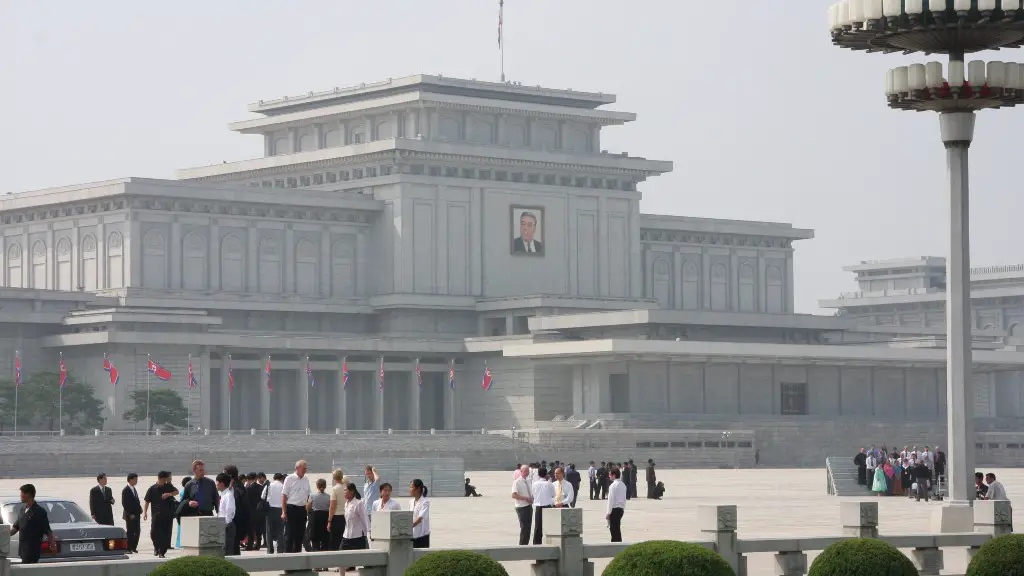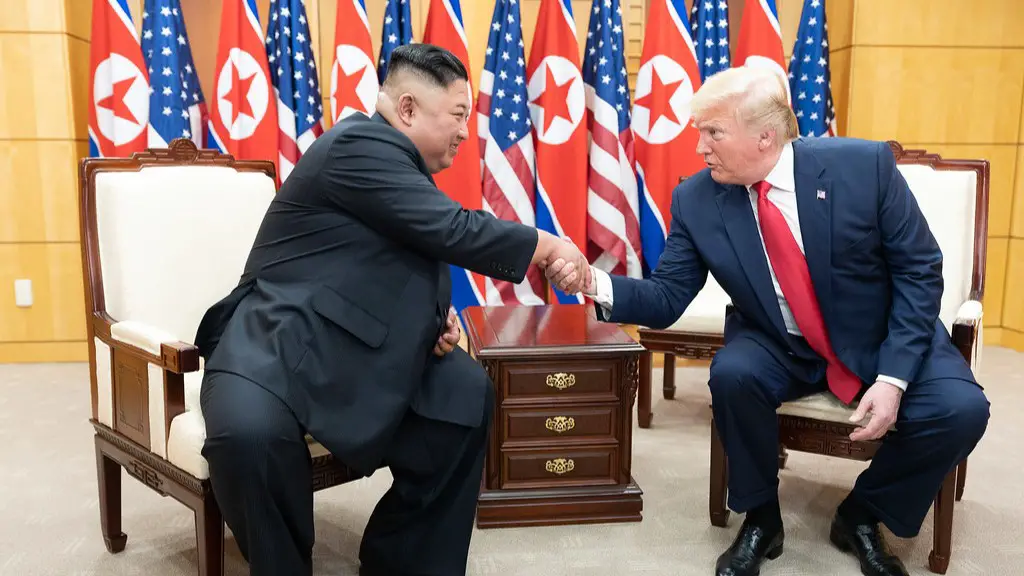What is the likelihood of North Korea attacking? For the past two decades, the isolated nation has posed a security threat not only to its close neighbors South Korea and Japan but to the entire world. Through its intercontinental ballistic missiles, North Korea has demonstrated its willingness and capability to use nuclear weapons against their foes. This raised the concern of a potential attack on the U.S. or its allies by the Kim Jong-Un-led regime and resulted in several peace negations. Yet, the possibility of a North Korean nuclear attack persists, making it essential for people to understand the current security threats and to examine the issue from various angles.
When assessing the risk of a North Korean attack, one must consider the political and military issues. Politically, the situation between the two countries has generally been tense. For one, North Korea has continued its nuclear weapons program despite multiple efforts from the international community to persuade the country to abandon it. This has strained diplomatic ties between countries and made North Korea itself increasingly isolated. Meanwhile, North Korea’s military capabilities are no longer diminished as they develop their capability to launch intercontinental life ballistic missiles equipped with nuclear warheads.
Apart from these factors, the potential attack must also be examined from an economic viewpoint. North Korea’s economy has long been hampered by international sanctions, which has made it increasingly difficult for the nation to buy what they need to sustain their current military activities. This could suggest that North Korea will not be inclined to use nuclear weapons against the U.S. or its allies since they know they will suffer the consequences of doing so.
The experts’ opinion about the likelihood of a North Korean attack also varies. While some consider the possibility of a nuclear strike very real, others believe that a more plausible outcome is a negotiated settlement akin to the Iran deal. For example, international affairs professor Robert Kelly told The Atlantic that “a negotiated solution is more likely because Kim [Jong-Un] has already demonstrated a willingness to talk” and that the “risk of military confrontation is low for now.”
On the other hand, former CIA Director Michael Hayden told CBS News that North Korea “can deploy a nuclear weapon against anyone in the region, and probably against the United States itself” and that the only way to truly contain North Korea is “a bloody nose, taking out a North Korean nuclear capability as a demonstration to the North Koreans of our seriousness.”
The range of explanations from different people highlights the complexity of the situation, as the likelihood of a North Korean attack largely depends on international diplomatic efforts as well as the country’s internal stance. Despite this, the risk of a military confrontation should not be disregarded, as North Korea has shown its willingness to use their nuclear capabilities in the past.
Advances in North Korea
In the recent years, North Korea has developed a formidable nuclear weapons program which poses a serious threat to the safety and security of the region. The rapid advancement of North Korea’s nuclear capabilities has been due to the country’s increasing access to resources and technology. For example, North Korea has utilized its abundant natural uranium resources to enrich uranium for their nuclear weapons program. Furthermore, North Korea has also acquired nuclear-capable missiles from China and other countries such as Pakistan, making it increasingly difficult for the international community to contain them.
North Korea’s advancements have been made despite repeated sanctions from the international community. These sanctions have had a significant economic impact on North Korea, making international trade and economic activity virtually impossible. In addition, these sanctions have also restricted North Korea’s access to nuclear weapons materials and limited their technological advancements. Despite this, North Korea has been able to continue their nuclear weapons development and delivery capabilities.
Despite improvements in North Korea’s capabilities, the country’s once formidable military strength has been weakened by the lack of resources and technology. This has led to a decrease in North Korea’s military capabilities and an inability to maintain its current nuclear weapons infrastructure. Additionally, North Korea has also been unable to acquire advanced military hardware and technology, further weakening their military capability.
Despite North Korea’s advancements, the country is still considered to be relatively weak and unable to launch a full-scale nuclear attack against the U.S. or its allies. This is due to the country’s limited resources and the lack of reliable and accurate delivery systems, as well as its continuous isolation from the rest of the world. However, North Korea still has the ability to launch limited nuclear attacks which could have devastating effects.
Kim Jong Un
Kim Jong Un is the current Supreme Leader of North Korea and has been in power since 2011. His rule has been marked by an aggressive foreign policy and a nuclear arms race aimed at deterring any military threat posed by the West. Kim Jong Un has been an avid supporter of North Korea’s nuclear efforts and has increased the country’s nuclear arsenal with the goal of achieving nuclear parity with the United States and its allies.
Kim Jong Un has shown an extreme commitment to the development of North Korea’s nuclear weapons program and has so far been successful in his endeavors. Under his rule, North Korea has conducted several missile tests, including the successful launch of an intercontinental ballistic missile capable of hitting any target on the mainland United States. In addition, North Korea has also tested multiple nuclear warheads, further bolstering its nuclear capabilities.
Additionally, Kim Jong Un has also implemented several economic reforms in North Korea to make the country less reliant on foreign aid. For example, he has opened the door for more foreign investment, although his primary focus has been on certain key industries such as the automobile industry. In addition, he has also loosened restrictions on imports, allowing North Korea to access vital technology and resources at a reduced cost.
Despite the reforms, Kim Jong Un’s rule has been marked by authoritarianism and a suppression of political dissidents. He has used oppressive measures to silence his critics, including the imprisonment and executions of those who oppose his rule. Furthermore, Kim Jong Un has also employed traditional tactics such as censorship, propaganda and a tight control of information to discourage any dissent against his rule.
Regional Impacts of a North Korean Attack
The potential impact of a nuclear attack by North Korea on the region cannot be overstated. The devastating physical effects of such an attack would affect South Korea and Japan the most, as both countries are in close proximity to North Korea. There would be massive destruction and loss of life in the regions closest to the explosion site, with far-reaching consequences for the entire region.
Moreover, a nuclear attack from North Korea would send shockwaves throughout the international community, resulting in increased tension and instability. Nations in the region would likely increase their military presence to deter any future threats, and the United States may feel pressure to intervene in the conflict. This could lead to a rapid escalation of the situation, potentially leading to a much larger-scale military conflict.
Furthermore, a potential attack by North Korea could also have a wide-reaching impact on the global economy. markets in the U.S. and other countries could suffer from heightened volatility due to decreased investor confidence. International trade could also be affected due to disruption in the supply of goods from the region, resulting in increased prices and shortages of vital goods.
In addition, the economic impact of a potential North Korean attack could extend beyond the region. Sanctions and embargos may be imposed on North Korea, further exacerbating the country’s already weak economy. There could also be implications for the international community, with the potential for global economic recession or even depression.
Proposed Solutions to Avoid a North Korean Attack
The potential of a North Korean attack has been a source of anxiety for many world leaders, and it is difficult to predict what the Kim Jong Un-led regime will do in the future. To avoid a potential attack, the international community must take a multi-faceted approach to resolving the current tensions. This may involve further economic sanctions and diplomatic negotiations designed to convince North Korea to abandon their nuclear weapons program and resume dialogue with their neighbors.
In addition, various countries have also proposed that military intervention should be considered if diplomacy fails. While this option is considered a last resort, it may be a necessary step if North Korea continues to progress with their nuclear weapons program. There have also been suggestions that a U.S.-lead coalition of countries should intervene to free the Korean peninsula from the Kim Jong Un-led regime.
While military intervention would be a drastic step, it could also lead to a resolution that is better for the region. This could involve the peaceful reunification of North and South Korea, a process that would likely require the assistance of the international community. In addition, it may also involve the full disarmament of North Korea and the adoption of a more peaceful foreign policy.
Furthermore, it is important to consider the impact a North Korean attack would have on the region and the wider world. A potential attack could result in a devastating loss of life and a major disruption of trade and travel in the region, leading to economic devastation. It is for this reason that it is important for the international community to take a proactive approach to resolving the current tensions and prevent any potential attack from occurring.





